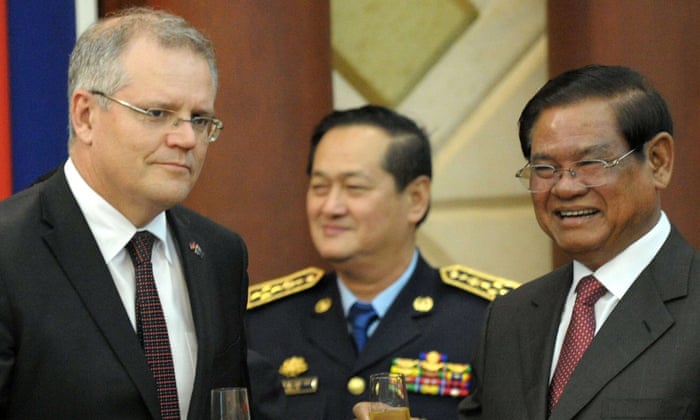 |
| Scott Morrison, the then immigration minister, and Cambodia’s interior minister, Sar Kheng, sharing a toast in Phnom Penh. The Australian government has been asked to intervene to prevent the deportation of refugees from Cambodia. Photograph: Tang Chhin Sothy/AFP/Getty Images |
Australia urged to stop Cambodia returning persecuted refugees to Vietnam
Cambodia plans to send 29 Montagnard refugees back to Vietnam where they face violence but advocates say Australia can apply pressure to stop move
The Guardian | 20 September 2017
Australia has been urged to pressure its refugee resettlement partner Cambodia to halt the “imminent return” of 29 Montagnard refugees to Vietnam where they face violent persecution.
Twenty-nine refugees from the ethnic and religious minority face deportation to Vietnam, despite the UN’s refugee agency offering to take the group out of Cambodia and protect them while a permanent third-country resettlement is found.
The group faced “almost certain arrest and persecution” upon return, the Asia Pacific Refugee Rights Network (APRRN) said, and “the Australian government has an ethical obligation to do everything in its power to stop such action”.
Asked on Wednesday about Cambodia’s treatment of refugees in its territory, the Australian prime minister, Malcolm Turnbull, defended his government’s Cambodia arrangement for resettling refugees from the Australian-run offshore detention islands in the south-east Asian country.
Twenty-nine of a group of 36 Montagnard refugees in Cambodia have had their claims for protection rejected by the Cambodian government, the APRRN said. But rights groups and the UN’s refugee agency believes the group faces persecution if refouled to Vietnam.
“Their case is considered so strong that the United Nations high commissioner for refugees (UNHCR) had previously assisted in brokering a deal that would have seen the group removed from Cambodia in preparation for resettlement to a third country,” APRRN said.
“Despite this generous offer, the Cambodian government has denied exit permits and has reaffirmed its intention to return the group to Vietnam.”
The UNHCR “at the highest levels, has written to the government of Cambodia, at the highest levels, to request that these individuals be allowed to leave Cambodia”. It remains “hopeful” the request will be accepted.
The Montagnard – also known as Degar – ethnic minority are the people indigenous to Vietnam’s central highlands. They face systematic and often violent political and religious persecution at the hands of the state. Over decades, many have fled the country, often over the land border to Cambodia.
Vietnam’s treatment of the Montagnard has been condemned on the floor of the Australian parliament.
Since 2014, Australia has had a resettlement arrangement with Cambodia, under which refugees from the Australian-run offshore detention islands of Manus and Nauru can choose to be resettled there.
The deal has attracted criticism over Cambodia’s poor human rights record and for its disproportionate cost given the protection offered. Australia has given an additional $40m in aid to Cambodia in return for the agreement, and pledged to pay up to $15m in resettlement costs but only seven refugees have chosen to go, and, of those, four have abandoned their protection claims and returned to their countries of origin.
But the deal gives Australia influence with the Cambodian government, the APRRN argues, and has urged the Australian government to intervene with Cambodian minister of the interior, Sar Kheng, to halt the imminent deportation of the Montagnard refugees.
Evan Jones, programme coordinator at APRRN, said if Cambodia returned the Montagnards to Vietnam it would clearly be in breach of the refugee convention principle of non-refoulement: that refugees must not be returned to danger.
Paul Power, the chief executive of the Refugee Council of Australia, said Australia had consistently used Cambodia’s status as a party to the refugee convention to argue in favour of its resettlement deal, “so it must act when Cambodia’s adherence to the refugee convention is clearly under threat”.
“The forced return of the Montagnards would not only undermine Cambodia’s reputation for respecting international law but would inflict further damage on Australia’s credibility on refugee protection.”
Turnbull confirmed on Wednesday that the Cambodia deal remained current, but that his government continued to seek other “third-country” resettlement options. “We have an arrangement with Cambodia, and we’ll always look at other options … we’ll continue to seek opportunities for resettlement. But I want to be very, very clear that the people on Nauru and in PNG will not be settled in Australia.”
Cambodia’s government faces an election next year and the country has been subjected to brutal, occasionally violent, anti-democratic measures, as the prime minister and former Khmer Rouge commander, Hun Sen, seeks to maintain his three-decade-long grip on power.
The opposition leader, Kem Sokha, has been charged with treason, independent media have been shut down, and organisations defending human rights attacked or silenced.
Asked about Cambodia’s human rights record and whether the country was an appropriate place to send refugees, Turnbull said: “I’m focused on ensuring that we keep our borders secure. We have an arrangement with the US which, as we’ve just described, is seeing a number of people being resettled there. We welcome that and we thank the United States government for their support.”
Australia’s other resettlement deal, with the US, accepted its first 50 refugees for resettlement on Wednesday.
About 1,600 of the 1,700 refugees on Australia’s offshore islands have expressed an interest in going to the US but it is not known how many more will be accepted or when they might go.


No comments:
Post a Comment